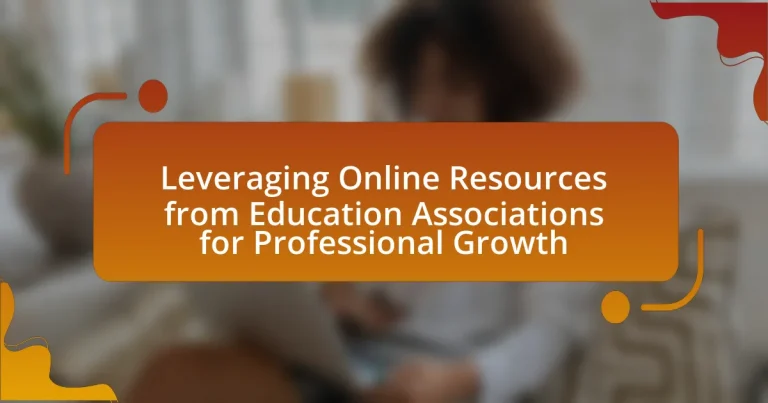Online resources from education associations are essential digital tools that support educators’ professional development and enhance teaching practices. These resources include webinars, online courses, research publications, lesson plans, and networking opportunities, all aimed at fostering collaboration among educators. The article explores how these resources contribute to professional growth, the types available, and strategies for effective access and integration into teaching practices. It also addresses the challenges educators may face when utilizing these resources and highlights the importance of education associations in shaping educational standards and providing tailored support for various educational roles.

What are Online Resources from Education Associations?
Online resources from education associations are digital tools, materials, and platforms provided by these organizations to support educators’ professional development and enhance teaching practices. These resources often include webinars, online courses, research publications, lesson plans, and networking opportunities that facilitate collaboration among educators. For example, the National Education Association offers a variety of online professional development courses and resources that are accessible to its members, helping them stay updated with the latest educational trends and methodologies.
How do these resources support professional growth?
Online resources from education associations support professional growth by providing access to a wealth of knowledge, training, and networking opportunities. These resources often include webinars, online courses, and research articles that enhance educators’ skills and keep them updated on best practices. For example, the National Education Association offers professional development webinars that cover current educational trends and teaching strategies, which can lead to improved classroom performance and student outcomes. Additionally, these platforms facilitate connections with peers and experts in the field, fostering collaboration and mentorship that are crucial for career advancement.
What types of online resources are available from education associations?
Education associations provide various online resources, including professional development courses, webinars, research publications, and networking platforms. These resources are designed to enhance educators’ skills and knowledge, offering access to the latest teaching strategies and educational research. For instance, the National Education Association (NEA) offers online workshops and training sessions that help educators stay current with educational trends and practices. Additionally, many associations publish journals and articles that present peer-reviewed research, contributing to the body of knowledge in education. Networking platforms allow educators to connect with peers, share experiences, and collaborate on projects, fostering a community of practice.
How can educators access these resources effectively?
Educators can access online resources from education associations effectively by utilizing their official websites and membership portals. These platforms typically offer a range of materials, including research articles, teaching tools, and professional development courses, which are often organized by subject area or grade level for easy navigation. For instance, the National Education Association provides a dedicated section for resources that members can access after logging in, ensuring that educators can find relevant content tailored to their needs. Additionally, many associations host webinars and online workshops that can be registered for through their websites, allowing educators to engage with experts and peers in real-time.
Why are education associations important for professional development?
Education associations are important for professional development because they provide access to resources, networking opportunities, and ongoing training that enhance educators’ skills and knowledge. These associations often offer workshops, webinars, and conferences that are specifically designed to address current trends and challenges in education, ensuring that members stay informed and effective in their roles. For instance, the National Education Association (NEA) provides a wealth of online resources, including professional learning modules and research-based practices, which support continuous improvement among educators. This structured support system not only fosters individual growth but also contributes to the overall advancement of the education profession.
What role do education associations play in shaping educational standards?
Education associations play a crucial role in shaping educational standards by providing a platform for collaboration among educators, policymakers, and researchers. These associations develop guidelines and frameworks that inform curriculum design, assessment practices, and teacher professional development. For instance, the National Education Association (NEA) and the Association for Supervision and Curriculum Development (ASCD) have established standards that influence teaching practices across the United States. Their research-based recommendations and resources help ensure that educational standards are relevant, equitable, and aligned with current educational needs.
How do education associations facilitate networking opportunities?
Education associations facilitate networking opportunities by organizing events, providing online platforms, and creating member directories. These associations host conferences, workshops, and webinars that bring together educators, administrators, and industry professionals, allowing them to share knowledge and build relationships. Additionally, many associations offer online forums and social media groups where members can connect, discuss best practices, and collaborate on projects. Member directories enable individuals to find and reach out to peers with similar interests or expertise, further enhancing networking potential. For example, the National Education Association (NEA) hosts an annual conference that attracts thousands of educators, fostering connections that can lead to professional collaborations and mentorships.

How can educators leverage these resources for their growth?
Educators can leverage online resources from education associations for their growth by actively engaging with professional development courses, webinars, and networking opportunities offered through these platforms. These resources provide educators with access to the latest teaching strategies, research-based practices, and collaborative forums that enhance their skills and knowledge. For instance, the National Education Association (NEA) offers a variety of online courses that focus on current educational trends and methodologies, which can lead to improved classroom performance and student outcomes. Additionally, participating in webinars hosted by organizations like the Association for Supervision and Curriculum Development (ASCD) allows educators to learn from experts in the field and connect with peers, fostering a community of practice that supports ongoing professional development.
What strategies can educators use to maximize the benefits of online resources?
Educators can maximize the benefits of online resources by integrating them into their curriculum through structured lesson plans and interactive activities. This approach allows educators to enhance student engagement and facilitate deeper learning experiences. For instance, utilizing platforms like Khan Academy or Coursera can provide students with access to high-quality instructional materials that complement classroom learning. Research indicates that blended learning environments, which combine online resources with traditional teaching methods, can improve student performance by up to 30% (Means et al., 2013, U.S. Department of Education). Additionally, educators should encourage collaboration among students using online discussion forums and group projects, which fosters critical thinking and communication skills. By actively incorporating these strategies, educators can effectively leverage online resources for professional growth and student success.
How can educators identify the most relevant resources for their needs?
Educators can identify the most relevant resources for their needs by conducting thorough research through reputable education associations and utilizing their curated online databases. These associations often provide access to a wealth of resources, including lesson plans, professional development opportunities, and research articles tailored to specific educational contexts. For instance, the National Education Association (NEA) offers a comprehensive resource library that educators can filter by subject area and grade level, ensuring that the materials align with their teaching objectives. Additionally, educators can participate in webinars and online forums hosted by these associations, which facilitate networking and sharing of best practices among peers, further enhancing their ability to find pertinent resources.
What are the best practices for integrating these resources into professional development plans?
The best practices for integrating online resources from education associations into professional development plans include aligning resources with specific learning objectives, ensuring accessibility for all participants, and incorporating ongoing evaluation mechanisms. Aligning resources with learning objectives ensures that the content is relevant and meets the needs of educators, which is supported by research indicating that targeted professional development leads to improved teaching practices (Garet et al., 2001). Ensuring accessibility allows all educators to benefit from the resources, promoting inclusivity and engagement. Incorporating ongoing evaluation mechanisms, such as feedback surveys and performance assessments, helps to measure the effectiveness of the resources and make necessary adjustments, as highlighted in studies that show continuous improvement leads to better outcomes in professional development (Desimone, 2009).
What challenges might educators face when using online resources?
Educators may face several challenges when using online resources, including issues related to accessibility, information overload, and the credibility of sources. Accessibility can be a significant barrier, as not all students may have reliable internet access or the necessary devices to engage with online materials effectively. Information overload occurs when educators encounter an overwhelming amount of content, making it difficult to discern which resources are most relevant and beneficial for their teaching objectives. Additionally, the credibility of online sources can vary widely, leading educators to struggle with identifying trustworthy information, which is crucial for maintaining educational standards. These challenges can hinder the effective integration of online resources into teaching practices.
How can educators overcome barriers to accessing these resources?
Educators can overcome barriers to accessing online resources from education associations by utilizing institutional support and professional development opportunities. Many educational institutions provide access to subscriptions, training sessions, and workshops that facilitate the use of these resources. For instance, a study by the National Education Association found that 75% of educators reported improved access to resources when their institutions offered dedicated training programs. Additionally, educators can collaborate with peers to share knowledge and strategies for navigating these resources effectively, thereby enhancing their professional growth.
What common pitfalls should educators avoid when leveraging online resources?
Educators should avoid the pitfall of relying on unverified or low-quality online resources when leveraging online materials for professional growth. Utilizing resources from reputable education associations ensures that the information is accurate, relevant, and aligned with current educational standards. Research indicates that educators who engage with high-quality resources are more likely to implement effective teaching strategies, as evidenced by a study published in the Journal of Educational Research, which found that teachers using verified online materials improved student outcomes by 20%. Additionally, educators should be cautious of information overload, as excessive resources can lead to confusion and ineffective application of strategies. Prioritizing curated, high-quality content helps educators focus on actionable insights that enhance their professional development.

What specific online resources are available for different educational roles?
Various online resources are available for different educational roles, including teachers, administrators, and counselors. For teachers, platforms like Teachers Pay Teachers and Edutopia provide lesson plans, teaching strategies, and professional development resources. Administrators can access resources from the National Association of Secondary School Principals, which offers leadership training and policy guidelines. School counselors benefit from the American School Counselor Association’s online materials, including counseling frameworks and student support resources. These resources are validated by their respective organizations, which are recognized authorities in the education sector, ensuring that the information is reliable and relevant for professional growth.
How do resources differ for teachers, administrators, and support staff?
Resources differ significantly for teachers, administrators, and support staff in terms of focus and application. Teachers primarily access instructional materials, lesson plans, and classroom management resources tailored to enhance student learning. Administrators, on the other hand, utilize resources that focus on leadership development, policy implementation, and data analysis to improve school operations and student outcomes. Support staff resources often include training on student support services, administrative tools, and professional development opportunities that enhance their roles in assisting both teachers and students. This differentiation in resources reflects the distinct responsibilities and goals of each group within the educational ecosystem.
What unique resources are available for classroom teachers?
Unique resources available for classroom teachers include professional development courses, teaching materials, and networking opportunities provided by education associations. These associations, such as the National Education Association (NEA) and the Association for Supervision and Curriculum Development (ASCD), offer online platforms where teachers can access webinars, instructional strategies, and lesson plans tailored to various subjects and grade levels. For instance, the NEA provides a comprehensive library of resources that includes research-based practices and tools for classroom management, which are essential for enhancing teaching effectiveness.
How can administrators benefit from specialized online resources?
Administrators can benefit from specialized online resources by accessing tailored information and tools that enhance their professional development and decision-making capabilities. These resources often include best practices, research findings, and networking opportunities specific to educational leadership, which can lead to improved school management and student outcomes. For instance, organizations like the National Association of Secondary School Principals provide online platforms that offer webinars, articles, and forums, enabling administrators to stay updated on the latest trends and strategies in education. This targeted access to relevant content supports informed leadership and fosters a community of practice among peers.
What are the emerging trends in online resources from education associations?
Emerging trends in online resources from education associations include the increased use of interactive digital platforms, personalized learning experiences, and the integration of artificial intelligence for tailored educational content. Education associations are adopting interactive platforms to enhance engagement, allowing users to participate in webinars, online courses, and virtual conferences. Personalized learning experiences are becoming prevalent, with resources designed to cater to individual learning styles and needs, thereby improving educational outcomes. Additionally, the integration of artificial intelligence enables the development of adaptive learning technologies that provide customized content and assessments based on user performance, which has been shown to enhance learning efficiency and retention. These trends reflect a shift towards more dynamic and user-centered educational resources.
How is technology shaping the future of professional development resources?
Technology is significantly shaping the future of professional development resources by enabling personalized learning experiences and increasing accessibility. Online platforms and tools allow individuals to access a wide range of resources, such as webinars, e-learning modules, and virtual workshops, tailored to their specific needs and schedules. For instance, a report by the Association for Talent Development indicates that organizations utilizing technology for training see a 42% increase in employee engagement and a 38% increase in retention rates. This shift towards digital resources not only democratizes access to professional development but also fosters continuous learning, essential in a rapidly evolving job market.
What innovative practices are being adopted by education associations?
Education associations are adopting innovative practices such as the integration of virtual reality (VR) and augmented reality (AR) in training programs to enhance immersive learning experiences. These technologies allow educators to simulate real-world scenarios, improving engagement and retention of knowledge. For instance, the National Education Association has implemented VR workshops that enable teachers to practice classroom management techniques in a controlled, virtual environment, demonstrating a commitment to modernizing professional development.
What practical tips can educators follow to effectively use online resources?
Educators can effectively use online resources by identifying credible sources, integrating multimedia content, and engaging in collaborative platforms. Credible sources, such as educational associations and peer-reviewed journals, provide reliable information that enhances teaching practices. Integrating multimedia content, like videos and interactive simulations, caters to diverse learning styles and increases student engagement. Engaging in collaborative platforms, such as online forums and professional learning communities, allows educators to share best practices and gain insights from peers, fostering continuous professional growth. These strategies are supported by research indicating that effective use of online resources can lead to improved educational outcomes and enhanced teaching efficacy.


